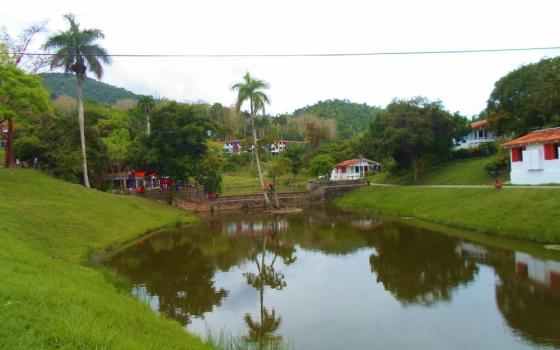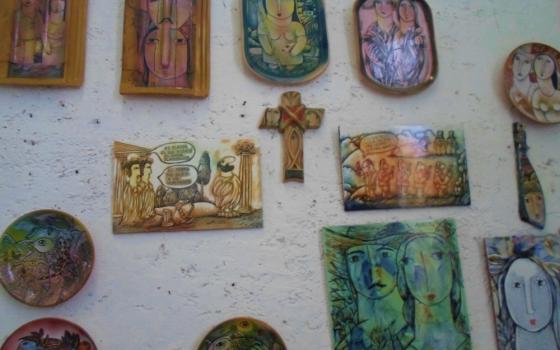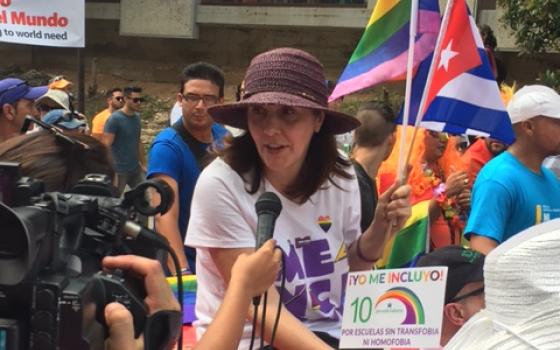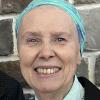A cluster of 1950s automobiles, especially bright pink and red Ford convertibles with fish-tail lights, took me back to high school days when my parents bribed me with a new car to get me to forgo my entrance into the convent. The big coupés and sedans I saw were not bribes, but the consequences of Cuba's prohibition on foreign automobile imports since the 1959 revolution.
With the recent relaxation of the ban, more modern cars also lined the streets of Havana; so my 15 companions and I boarded a brand new air-conditioned tourist bus imported from China. We were with the Rainbow World Fund, an LGBT-based humanitarian aid organization that helps those affected by natural disasters, hunger, poverty, disease, oppression and war. For about two weeks, we visited projects that serve the Cuban people, met with church leaders, government officials, artists, stakeholders in many fields, and also attended some LGBT events.
Our stay was timed to include participation in celebrations for the International Day against Homophobia and Transphobia, May 17. Gone are the days when the Cuban government imprisoned LGBT people or quarantined those with HIV/AIDS. Public attitudes have changed, largely due to the work of Cuba's leading advocate of LGBT acceptance and legalization of same-sex unions, Mariela Castro. The married mother of three, who is the daughter of President Raul Castro and niece of the deceased Fidel Castro, was the natural star of the annual pride parade. Our U.S. delegation wildly waved rainbow flags as 2,000 marchers strolled through the streets of Havana.
At a gala celebration the evening before the march, Mariela Castro presented an award to the Rev. Raul Suárez. The Baptist pastor, who founded the Martin Luther King Center in Old Havana, was instrumental in effecting Cuba's radical changes toward religion. Catholics are generally not aware that, with the constitutional alterations in 1992, Cuba is now neither religious nor atheist, but a secular state. Religious discrimination and restrictions on religious displays have eased, and religious organizations can own properties, all of which are tax-exempt.
Although freedom of religion is protected by the constitution and Cubans can worship where and when they want, I saw the effects of decades of atheism. I had difficulty finding any items of Christian art, or religious art of any kind, at the tourist marketplaces, the Fuster communitarian art project, or ceramics crafts workshops we visited. The rejection of the revolution by Catholic leaders not only diminished the number of church-going Catholics but also seemed to affect artistic expression in the creative use of sacred symbols.
Unlike the present U.S. administration, Cuba promotes the sustainable use of its natural resources. We visited Sierra del Rosario, one of almost 700 protected world areas, which has been designated by UNESCO as a Biosphere Reserve. I loved the natural landscape and lush vegetation that met the eye as far as one could see. The fact that the government built a sustainable community here for the area's workers reminded me of one of FDR's New Deal experiments during the depression. Three "green" towns were built as models of future public housing in the United States; unfortunately, only one survives today.
Cuba's educational system is universal and free at all levels. Relinquishing Catholic schools and hospitals after the revolution was worth it. What Catholic control could not accomplish, the Cuban government did: i.e., a 99-percent literacy rate and the best health care system in Latin America.
Cuba's clinics and rehabilitation centers, which are located in each province and city, are a tangible sign of its commitment to universal and free health care. Priority is given to preventive medicine, prompting the director-general of the World Health Organization to extol Cuba as a model in health care for other countries to imitate.
If Cuba can provide universal health care, why can't the United States? A recent article in The Atlantic documented that Cubans live as long as U.S. Americans and spend less than a 10th of the cost per person annually on health care. Critics complain that treatment is not prompt and those with money can receive faster and better care. Can't the same criticism be made about the U.S. health care system? At least in Cuba, there is a commitment that all people are kept healthy.
If Cuba's health-care system is government controlled, then U.S. health care is equally controlled, although by different entities. Is it better to have a government that prioritizes health care because it considers health a universal human right manage the system; or to have the system in the hands of insurance, pharmaceutical and hospital groups, whose main concern is often profit?
When I have shared observations about my trip to Cuba with U.S. friends, the responses often reflect the economic views of the listener. In Cuba, a number of church leaders and ordinary people told me that the majority of Cubans do not want capitalism, although they recognize existing problems with socialism. One Baptist pastor said, "The bad practice of socialism is that we have just one party and there is too little freedom of expression." Referring to the "bad practices" of capitalism, he simply said, "I visited Argentina and saw the transnational corporations crush the livelihood of families. … We were building a just and equal society here, but now many people want to better themselves economically, no matter what, by capitalist practices. I just vote for the values that are most important in society."
How tragic that President Donald Trump has reversed the Obama administration's efforts to normalize relations with Cuba. The Cuba of 1959 is not the Cuba of 2017. My visit convinced me that we need to allow people, communities, and nation states to change and develop. I often think of Cardinal John Henry Newman's remark: "To live is to change and to be perfect is to have changed often." Like many people, I find change difficult and get stuck in my established ways of thinking and acting.
I believe that good and bad are present alongside each other practically everywhere — in each person or group or system. I struggle to resist the easy human tendency to fall into dualist categories of "all-good" or "all-bad." Life is messy, not clear-cut. Why not look for the good, as well as the bad, in other people or social orders? This is an enormous challenge when I think of people in positions of power. Why not take the best policies from any system to steadily realize a fairer society where the "haves" have enough, but not too much, and the "have-nots" just disappear? If we engage in a spiritual purification personally and publicly, perhaps someday we will see many societies where old and new automobiles run along the same street.
[Jeannine Gramick is a Sister of Loretto who has been involved in a pastoral ministry for lesbian and gay Catholics since 1971. She co-founded New Ways Ministry and has been an executive coordinator of the National Coalition of American Nuns since 2003.]



